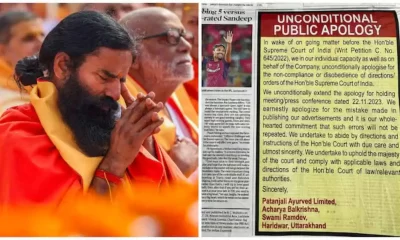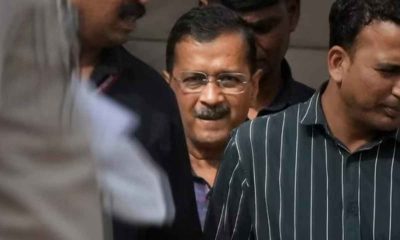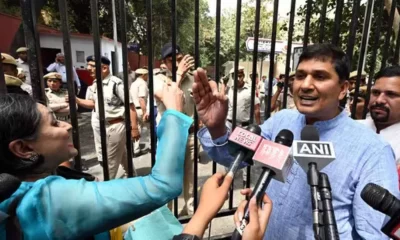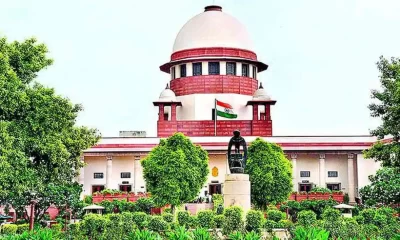India News
Article 370 hearing: Supreme Court seeks timeframe to restore Jammu-Kashmir statehood, Centre to respond on Thursday
The bench noted that the Centre has to make a statement before the court to show how they can convert a state into an UT and how long will this continue.
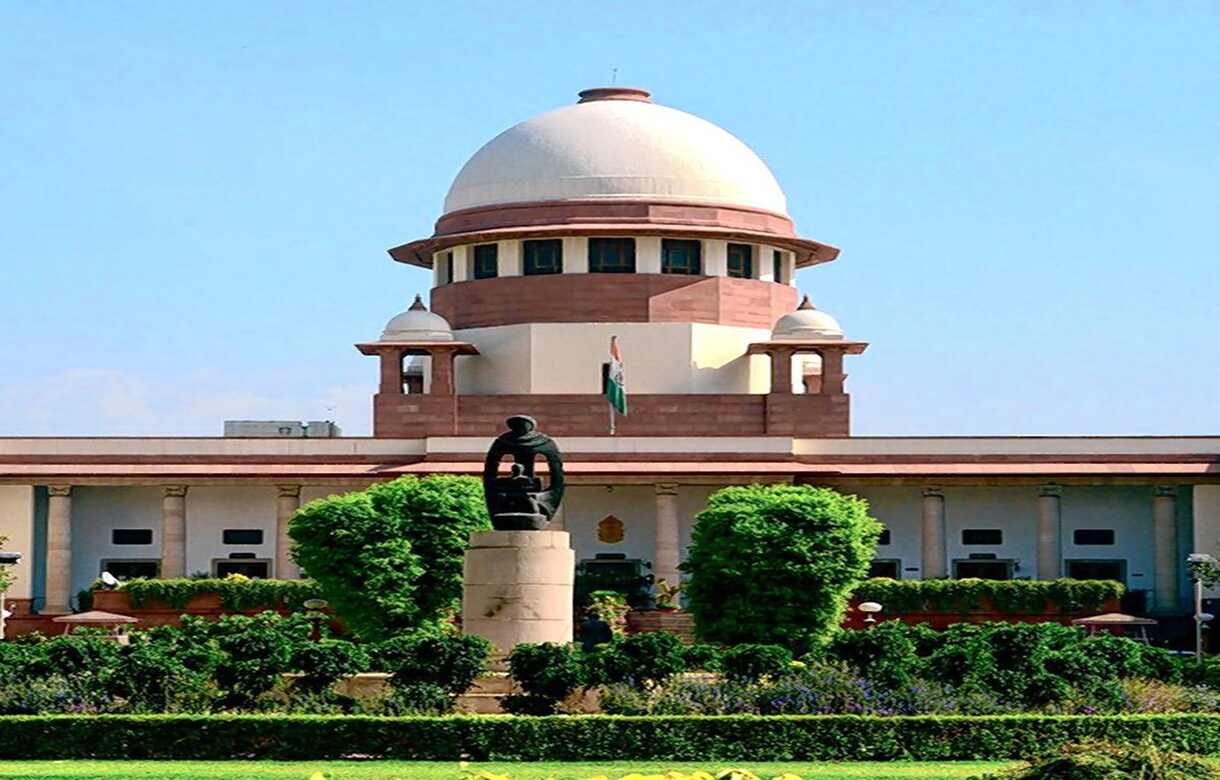
The Supreme Court on Tuesday sought a timeframe from the Centre to restore statehood to Jammu and Kashmir. The apex court was hearing petitions challenging the scrapping of Article 370. The Court also asked for a roadmap into this progression.
Since 2019, Jammu and Kashmir has been bifurcated into two Union Territories. At present, a Supreme Court bench headed by Chief Justice of India DY Chandrachud is hearing a batch of petition challenging the scrapping of Article 370, that granted special status to the erstwhile state of Jammu and Kashmir.
During the hearing, Solicitor General Tushar Mehta who is representing the Centre informed the apex court that the decision to bifurcate Jammu and Kashmir into two Union Territories was a temporary measure. He added that statehood would be restored to Jammu and Kashmir, while Ladakh will remain an Union Territory. Tushar Mehta further noted that he is looking forward to making a positive statement on Thursday, August 31.
Considering Solicitor General Tushar Mehta’s arguments, the bench led by Chief Justice DY Chandrachud asked how temporary the decision is and when the elections will be conducted in Jammu and Kashmir.
The bench further questioned if there is a roadmap that the Centre can show. The bench noted that the Centre has to make a statement before the court to show how they can convert a state into an UT and how long will this continue. The bench underlined that restoration of democracy is important.
Responding to the bench, Tushar Mehta said that the District Development Council (DDC) elections were conducted in Jammu and Kashmir in 2020. It was the first election carried out after the scrapping of Article 370.
Giving an account on the situation in Jammu and Kashmir before and after the abrogation of Article 370, Tushar Mehta highlighted that there were hartals and attacks due to which banks and educational institutes used to be shut down repeatedly. He added that there is peace and normalcy in Jammu and Kashmir. He mentioned that when state recognition will take place, there is a blueprint for how the government will work just like the way youth were taken into the mainstream.
2024 Lok Sabha Elections
Smriti Irani takes a swipe at Rahul Gandhi for calling Amethi his home but contesting Lok Sabha elections from Wayanad
Smriti Irani criticised the Rahul Gandhi for changing his families and said they have seen people changing colours, but for the first time changing families is being witnessed.
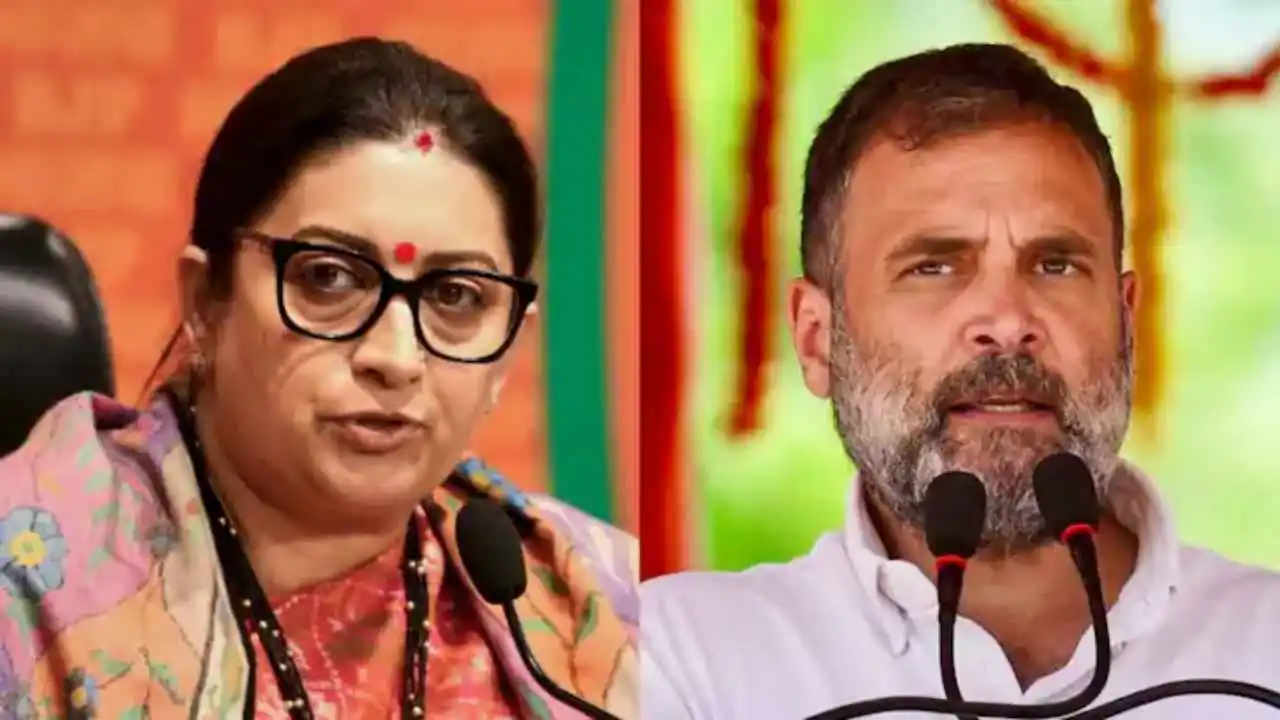
Union Minister Smriti Irani took a swipe at Rahul Gandhi on Saturday during a rally in Uttar Pradesh’s Amethi. While addressing the public rally, Irani said Rahul Gandhi spoke about his relations in Amethi and then he went to Wayanad where he declared the Kerala seat as his home as he filed for his nomination for the Lok Sabha elections.
Smriti Irani, who will be contesting her Amethi seat yet again, criticised the Rahul Gandhi for changing his families and said they have seen people changing colours, but for the first time changing families is being witnessed. The Union minister urged the people of Amethi to cast their votes on May 20, the day when Amethi goes for elections. She talked about the benefits of voting for BJP and said, the poor will get free ration for five years, farmers will get Rs 6,000 every month, and will get Rs 5 lakh every year under the Ayushman Bharat scheme.
Irani further added that Congress on the other hand has declared that it will calculate the wealth of the people if voted to power. She took a swipe over Congress candidates and said the grand old party is yet to announce its candidates for two key constituencies in Uttar Pradesh – Amethi and Raebareli, which have historically been the Congress’s stronghold. The BJP leader said that now that the polling in Wayanad has concluded, the Congress candidate will arrive in Amethi, but will first visit the Ram Temple.
She slammed Congress for rejecting the invitation to the Ram Temple Pran Pratishtha and said they rejected the invitation to the Ram temple Pran Pratishtha, now they will go to the Ram temple as they believe that this will get them votes in the ongoing Lok Sabha elections which means now they will go to the extent of betraying god as well.
2024 Lok Sabha Elections
Lok Sabha election 2024: Nearly 50% voter turnout recorded in second phase till 3 pm
The constituencies going to polls today include all 20 Lok Sabha seats in Kerala, 14 in Karnataka, 13 in Rajasthan, and others spread across different states.
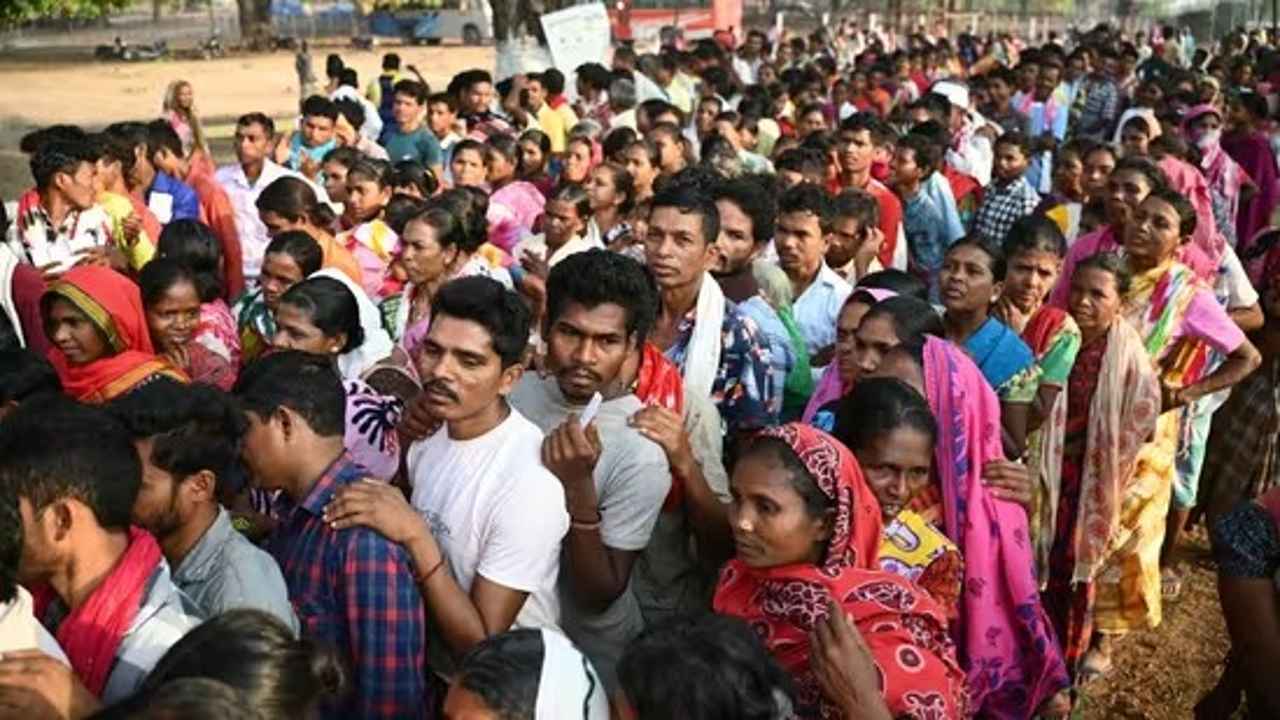
In the second phase of Lok Sabha elections 2024, over 50% of voters were registered in 13 states and the UTs till 3 p.m. 65% of voters participated in the first round of the Lok Sabha elections.
The 18th Lok Sabha elections are currently in their second phase, with voting for 88 seats taking place across 13 states and union territories. There are more than 1,200 people running for office, four of them are from outside Manipur.
Union minister Rajeev Chandrasekhar, BJP members Tejasvi Surya, Hema Malini, and Arun Govil, Rahul Gandhi and Congress leader Shashi Tharoor, DK Suresh, the brother of Karnataka Deputy Chief Minister DK Shivakumar, and former chief minister HD Kumaraswamy are among the notable contenders for the second phase.
In 2019, the NDA had won 56 of the 89 seats and the UPA 24. Six of these seats have been redrawn as part of the delimitation exercise.
The first phase of the seven stages of the elections took place on Friday, including 102 seats spread across 21 states and Union territories. Voter turnout was about 65.5% in the first phase, according to the reports.
In biggest festival of democracy, people from all walks of sector took part in it. A video went viral where former India captain and current Indian team head coach Rahul Dravid and former India player and head coach Anil Kumble were seen standing in line to cast their vote.
Meanwhile, voting started at 7 a.m. and will end at 6 p.m. The Election Commission has extended voting hours for those who are in line by an hour. According to Election Commission figures, the first two hours saw a 9.3% voter turnout throughout the 88 constituencies. By 9 am, Kerala had recorded 8.52%, Karnataka 9.21%, and Madhya Pradesh 13.82%.
In this phase, there were about 15.88 crore eligible voters, comprising 5.929 third-gender electors, 8.08 crore males, and 7.8 crore women. 3.28 crore young voters, aged 20 to 29, are among them; 34.8 lakh of them are first-time voters.
2024 Lok Sabha Elections
Lok Sabha elections 2024: 102-year-old man walks to polling booth to cast his vote in Jammu
The lowest voter turnout so far was noted in Ramgarh at 1.53%.
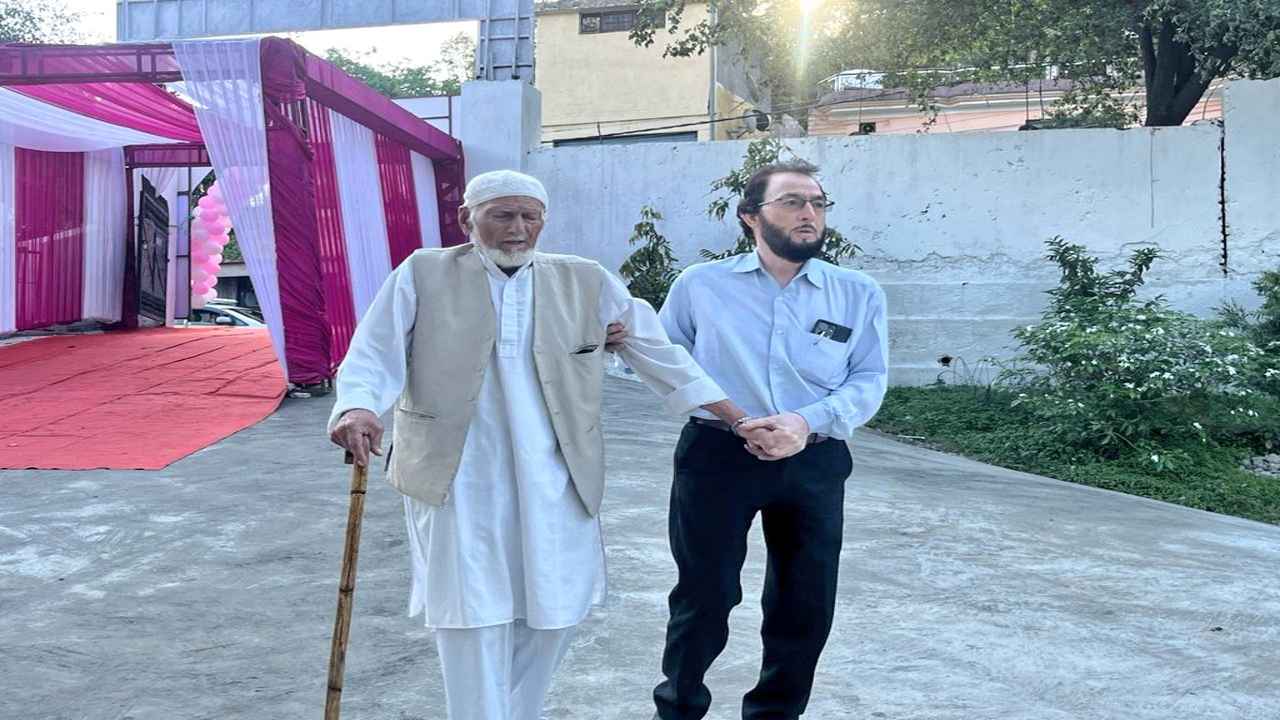
A 102-year-old man showed up at a Jammu polling place to cast his vote in the second phase of the Lok Sabha elections on Friday. Haji Karam Din arrived at the Reasi district polling place in the Jammu constituency with a walking stick in hand and a family member who assisted him with the pre-voting process.
Haji Karam Din, who is 102-year-old, showed his inked finger and posed for pictures outside the polling booth after casting his vote. He said voting at this polling place at this age makes him very happy. He has always cast his vote. Even at the age of 102, this experience is still ongoing, he said.
Reasi district is a part of the Jammu parliamentary constituency, and 22 candidates are up for vote with around 17.81 lakh eligible voters.
BJP’s sitting member Jugal Kishore Sharma is aiming for a third term in office following wins in the elections of 2014 and 2019. Former minister and Congress candidate Raman Bhalla is his main opponent.
Voting in the Jammu-Reasi Lok Sabha constituency began with eager voters showing up at the polling places. Some of them were wearing traditional Dogra attire.
In 2,416 polling places around the constituency, voting got underway at 7 a.m., and 10.39% of the total votes were cast by 9 a.m. In the 2019 Lok Sabha elections, Jammu recorded a 74% voter turnout.
Following the repeal of Article 370 and the division of the former state into two Union Territories five years ago, this is Jammu’s first significant election.
The Akhnoor segment received the highest percentage of votes, 14.24%, followed by Reasi (14.13%), Gulabgarh (13.53%), Shri Mata Vaishnodevi (12.71%), Marh (12.31%), Samba (8.56%), R S Pura Jammu South (8.17%), and Suchetgarh (5.67%), according to the officials. Ramgarh recorded the lowest voter participation of 1.53% so far.
Low attendance was observed in the border areas of the districts of Jammu and Samba till nine in the morning, according to poll data.
The officials said that big lines of voters were observed at several polling places throughout Jammu city. Voters were observed heading towards polling places early in the morning.
-
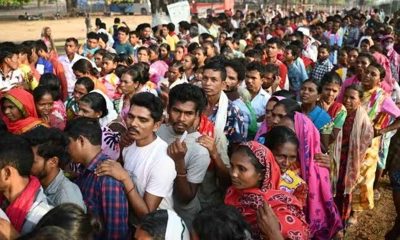
 2024 Lok Sabha Elections22 hours ago
2024 Lok Sabha Elections22 hours agoLok Sabha election 2024: Nearly 50% voter turnout recorded in second phase till 3 pm
-

 2024 Lok Sabha Elections20 hours ago
2024 Lok Sabha Elections20 hours agoElection Commission books BJP MP Tejasvi Surya for seeking votes in the name of religion
-

 Cricket news3 hours ago
Cricket news3 hours agoIPL 2024: Punjab Kings beat Kolkata Knight Riders by 8 wickets to chase down highest T20 total
-

 2024 Lok Sabha Elections55 mins ago
2024 Lok Sabha Elections55 mins agoSmriti Irani takes a swipe at Rahul Gandhi for calling Amethi his home but contesting Lok Sabha elections from Wayanad

